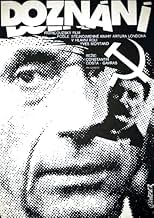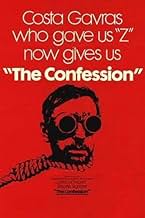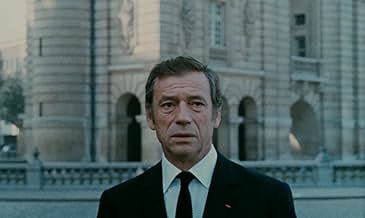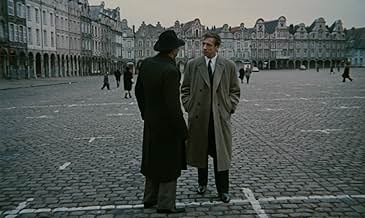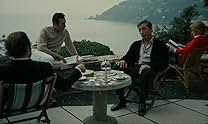IMDb-BEWERTUNG
7,8/10
5153
IHRE BEWERTUNG
Ein hochrangiger Beamter wird gezwungen, Hochverrat zu begehen.Ein hochrangiger Beamter wird gezwungen, Hochverrat zu begehen.Ein hochrangiger Beamter wird gezwungen, Hochverrat zu begehen.
- Nominiert für 1 BAFTA Award
- 3 Gewinne & 3 Nominierungen insgesamt
Empfohlene Bewertungen
I got dragged into this movie like the protagonist got dragged into the brutal, endless interrogation. Given the overall vapidity of most of today's films, this is a real diversion into the power that really lies beneath the surface of movies, the acting, the writing, directing, and most important the mood. The mood of this film drags you like it does the character played by Yves Montand, as he endures a two year interrogation by the people's republic. It's real historic as well, full of details about Titoists, Trotskyites, and anarchists and paranoia over the struggle to control the communist revolution. But Montand looks great as he endures an impressive variety of interrogation techniques.
Anton Ludvik, aka Gerard, is vice-minister of Foreign Affairs of Czechoslovakia. He realizes he is watched and followed. One day, he is arrested and put into jail, in solitary confinement. Will be shown the mental tortures during the investigations and how a faithful top-ranking civil servant is made to confess to treason.
A French political thriller based on a real story in Czechoslovakia? Wow! This actually makes a lot of sense. The Czech people do not have many stories told about them, but they do happen to live in an unfortunate area, sandwiched between Germany and Russia. And, as we know, throughout the 20th Century, those two nations liked to assert their influence on the neighbors.
It is so great to see the story here of a man who stood against the Nazis now having to fight back against the politicians he helped support (sort of).
A French political thriller based on a real story in Czechoslovakia? Wow! This actually makes a lot of sense. The Czech people do not have many stories told about them, but they do happen to live in an unfortunate area, sandwiched between Germany and Russia. And, as we know, throughout the 20th Century, those two nations liked to assert their influence on the neighbors.
It is so great to see the story here of a man who stood against the Nazis now having to fight back against the politicians he helped support (sort of).
The split between Tito and Stalin (1948), in the late 1940s and early 1950s, was followed by show trials of prominent Communists all over Eastern Europe and the wave of Stalinist purges in which tens of thousands suffered or lost their lives. This movie is about the 1952 process in Prague, conducted against Rudolf Slánský and 13 other leading members of the Communist Party of Czechoslovakia (KSC). The main protagonist - Anton Ludvik, aka Gerard, is based on Arthur London, veteran of the Spanish Civil War and the French resistance movement, who, at the time of the arrest, was vice-minister of Foreign Affairs of Czechoslovakia and a senior official of KSC. Display of Stalinist torture and interrogation process in preparation for rigged political trial is very realistic. Based on actual events.
I saw this film last night and it has being going around in my head all day. It builds with a slow intensity which becomes absolutely compulsive. In style it reminded me a lot of The Godfather films. Calm, matter of fact but intensively observed portrayals of almost unbelievably hideous events. It has the same effect - if you stop to watch for just a few seconds, you are irresistibly drawn into the stream of events. Yves Montand is at his down beat best. What struck me most is that this true story of the post-way purges in the USSR's East European client states is of a time and place almost inconceivable to most of us now. The blind belief in The Party, the Inquisition-like mind games of the interrogators that convince the accused that to demonstrate their true loyalty to the Party, they must confess to the most ridiculous accusations of their betrayal of it. And I was surprised to see that it was made in 1971, the feel is absolutely contemporary, even though it depicts such far off events. While I was watching, I was convinced that I knew the story - isn't this the same as Koestler's 'Darkness at Noon'?
I'll start this review by saying that although I do consider Gavras to be a very good and skillful director, at the same moment I consider him overrated by many, at least according to the films I have seen of him (Z, Mad City and Amen). However, in this film he really left me at some moments breathless! The film is set in an unnamed communist state of Eastern Europe, a satellite of the USSR. The main character had recently reached the Supreme Council of the Party by being appointed Minister. He has a rich history behind him as a communist fighter and politician. However, one morning, some guys from the secret police arrest him (and others as we later find out), throw him in a cell, try to break his will and make him confess of his unloyalty to the Party, something that he never committed though. Of course it is the Soviets who demanded his imprisonment and confession and the puppet government has to oblige.
We had this film shown at the university here two weeks ago and I really couldn't understand why some guys found it "boring". It showed things that seem really barbarous to us now but they DID happen to MANY people back then. And many of them did not have the influence the character of this film had. I suppose the people who made this criticism judge a movie by how many explosions and cold jokes it has in it but that's not the point here. This movie HAD to have a slow pacing in order to show how hard it is for the days to pass in this madhouse-prison.
The acting is great, especially from Yves Montand and all those actors who play the crazy communist officials :p It's thrilling to see the character's facial expressions change throughout the film showing suspicion at first before he gets arrested... then shock... then despair... and then plain stubbornness and exhaustion. It's obvious that everyone took this film very seriously and thus the great performances! Another thing that surprised me and was also mentioned by the (unfortunately only) other reviewer of this film is that it was shot in 1971. This is noticeable on its own, because it was a time that not only the Soviet Union was still strong (with Brezniev trying to show a "nicer" but also stronger face to the world) but the Communist Party in France had also great support and numbers of voters. I would like to know more about how the French audience reacted when the film was screened for the first time back then...
Overall, it is a movie that I would recommend anyone watching. It is a good and graphic display of how far the demands of power can reach and the paranoid mentality of the Cold War (and it would be wise to remember that this mentality and these incidents did not only take place in the East side but in the West as well). If you find it on VHS (since I doubt that it is released on DVD) just grab it!
We had this film shown at the university here two weeks ago and I really couldn't understand why some guys found it "boring". It showed things that seem really barbarous to us now but they DID happen to MANY people back then. And many of them did not have the influence the character of this film had. I suppose the people who made this criticism judge a movie by how many explosions and cold jokes it has in it but that's not the point here. This movie HAD to have a slow pacing in order to show how hard it is for the days to pass in this madhouse-prison.
The acting is great, especially from Yves Montand and all those actors who play the crazy communist officials :p It's thrilling to see the character's facial expressions change throughout the film showing suspicion at first before he gets arrested... then shock... then despair... and then plain stubbornness and exhaustion. It's obvious that everyone took this film very seriously and thus the great performances! Another thing that surprised me and was also mentioned by the (unfortunately only) other reviewer of this film is that it was shot in 1971. This is noticeable on its own, because it was a time that not only the Soviet Union was still strong (with Brezniev trying to show a "nicer" but also stronger face to the world) but the Communist Party in France had also great support and numbers of voters. I would like to know more about how the French audience reacted when the film was screened for the first time back then...
Overall, it is a movie that I would recommend anyone watching. It is a good and graphic display of how far the demands of power can reach and the paranoid mentality of the Cold War (and it would be wise to remember that this mentality and these incidents did not only take place in the East side but in the West as well). If you find it on VHS (since I doubt that it is released on DVD) just grab it!
Wusstest du schon
- WissenswertesThe film was restored in 2014 by KG Productions with the support of the CNC under the supervision of Costa-Gavras by Éclair Group for the image and L.E. Diapason for the sound.
- VerbindungenEdited into Der letzte Bolschewik (1993)
- SoundtracksL'Aveu (Générique)
Written by Giovanni Fusco
Top-Auswahl
Melde dich zum Bewerten an und greife auf die Watchlist für personalisierte Empfehlungen zu.
- How long is The Confession?Powered by Alexa
Details
- Erscheinungsdatum
- Herkunftsländer
- Sprachen
- Auch bekannt als
- The Confession
- Drehorte
- Grand Place, Arras, Pas-de-Calais, Frankreich(London seeing Kahoutek for the last time)
- Produktionsfirmen
- Weitere beteiligte Unternehmen bei IMDbPro anzeigen
Box Office
- Bruttoertrag in den USA und Kanada
- 329.954 $
Zu dieser Seite beitragen
Bearbeitung vorschlagen oder fehlenden Inhalt hinzufügen

